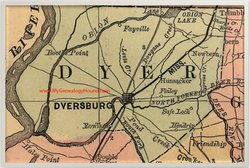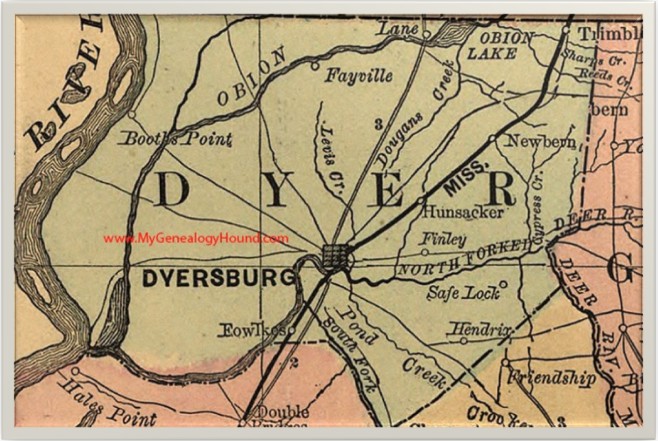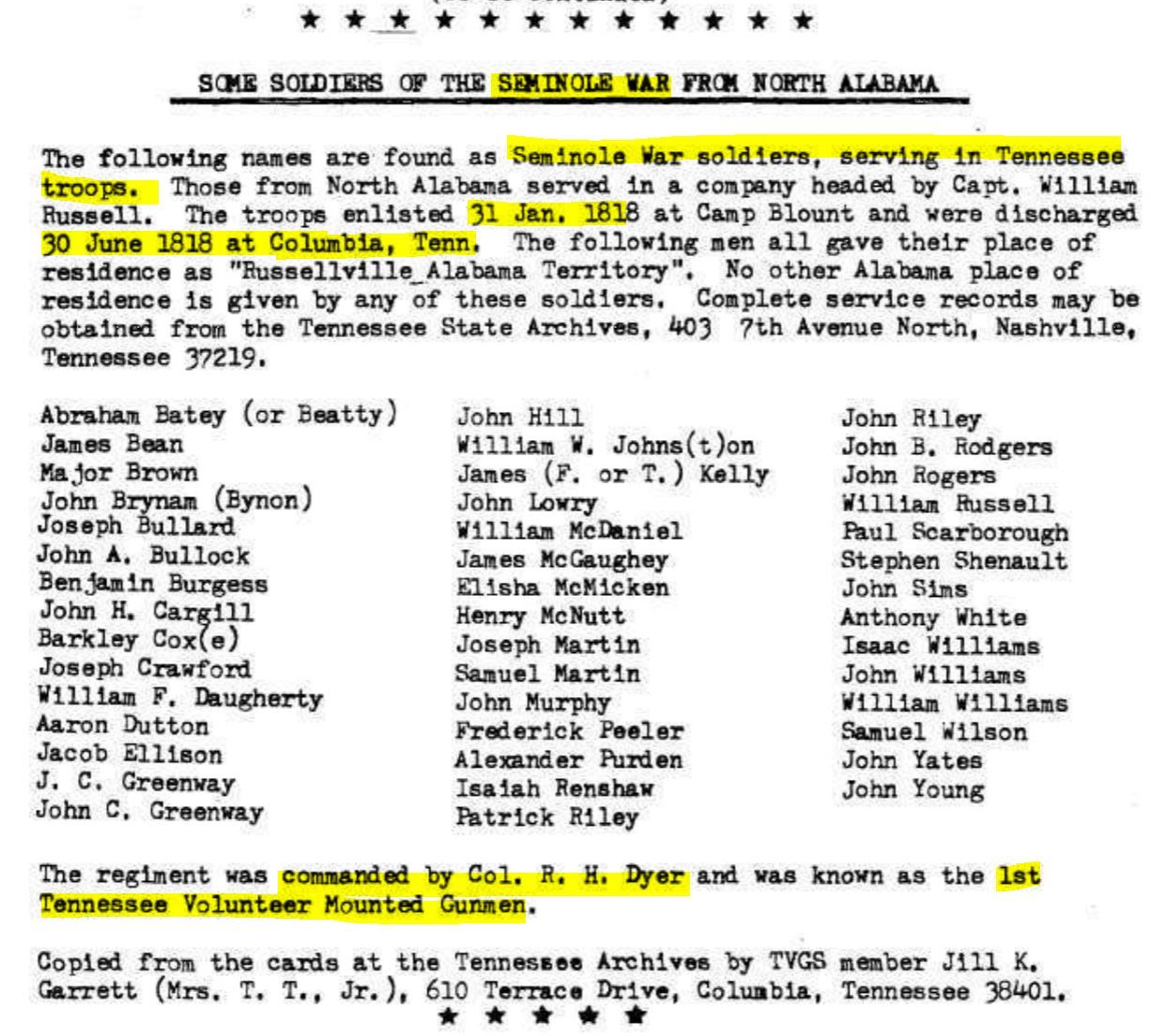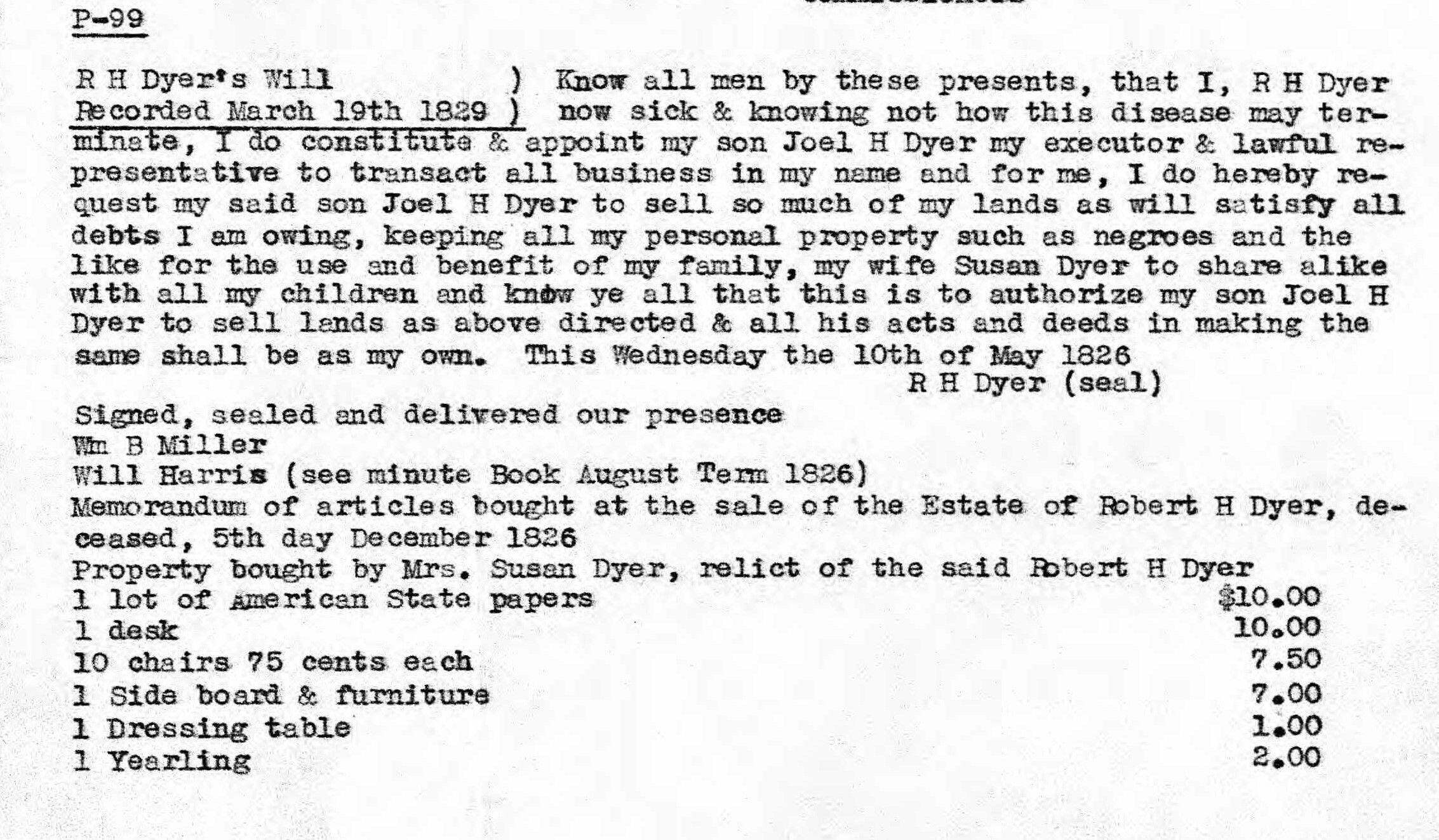-- Jackson Gazette, May 13, 1826, cited in Ancestry Story,http://trees.ancestry.com/tree/25258414/person/1644568447/mediax/2?pgnum=1&pg=0&pgpl=pid%7CpgNum&ftm=1
Dyer County,Tennessee was named for him.Dyer County was founded by a Private Act of Tennessee, passed on October 16, 1823. The area was part of the territory in Tennessee that was previously legally occupied by Chickasaw Native American people.
Robert Henry Dyer participated in the Nickajack Expedition. The Nickajack Expedition was a long-running battle fought from late summer to fall of 1794 between American frontiersmen and the Chickamauga Cherokee. The military expedition was a decisive success for the American settlers of the Southwest Territory and surrounding regions, eventually becoming known as the "Last Battle of the Cherokee".
He was a lieutenant in the Cavalry Regiment, 5th Tennessee Brigade in 1807 and Captain in 1810 and a Lieutenant Col. in the Natches Expedition 1812-1813.
The Natches Expedition:On November 1812, the Governor of Tennessee received a call for 1500 volunteers for the defense of New Orleans. Thus President Madison concealed the real purpose of this expedition to Natchez, which was the invasion and occupation of West Florida, for New Orleans was not then threatened by the British. Andrew Jackson was Major-General of Tennessee Militia. John Coffee raised a troop of cavalry, and when Jackson's army was finally organized, Coffee was elected Colonel of the regiment of cavalry, or mounted gunmen, numbering 670. They assembled at Franklin, and on January 19, 1813, the overland march began. On February 16, they united with Jackson's other two regiments. They stopped at Washington, in the territory of Mississippi, a short way from Natchez. Great was the disappointment of officers and men when, after a month of idleness, an order came from the War department to disband, General Jackson, instead, led the force back to Nashville at his own expense, for which he was later reimbursed.-Tennessee Genealogy Trails http://genealogytrails.com/tenn/index.html-Allie Nelson
-- Jackson Gazette, May 13, 1826, cited in Ancestry Story,http://trees.ancestry.com/tree/25258414/person/1644568447/mediax/2?pgnum=1&pg=0&pgpl=pid%7CpgNum&ftm=1
Dyer County,Tennessee was named for him.Dyer County was founded by a Private Act of Tennessee, passed on October 16, 1823. The area was part of the territory in Tennessee that was previously legally occupied by Chickasaw Native American people.
Robert Henry Dyer participated in the Nickajack Expedition. The Nickajack Expedition was a long-running battle fought from late summer to fall of 1794 between American frontiersmen and the Chickamauga Cherokee. The military expedition was a decisive success for the American settlers of the Southwest Territory and surrounding regions, eventually becoming known as the "Last Battle of the Cherokee".
He was a lieutenant in the Cavalry Regiment, 5th Tennessee Brigade in 1807 and Captain in 1810 and a Lieutenant Col. in the Natches Expedition 1812-1813.
The Natches Expedition:On November 1812, the Governor of Tennessee received a call for 1500 volunteers for the defense of New Orleans. Thus President Madison concealed the real purpose of this expedition to Natchez, which was the invasion and occupation of West Florida, for New Orleans was not then threatened by the British. Andrew Jackson was Major-General of Tennessee Militia. John Coffee raised a troop of cavalry, and when Jackson's army was finally organized, Coffee was elected Colonel of the regiment of cavalry, or mounted gunmen, numbering 670. They assembled at Franklin, and on January 19, 1813, the overland march began. On February 16, they united with Jackson's other two regiments. They stopped at Washington, in the territory of Mississippi, a short way from Natchez. Great was the disappointment of officers and men when, after a month of idleness, an order came from the War department to disband, General Jackson, instead, led the force back to Nashville at his own expense, for which he was later reimbursed.-Tennessee Genealogy Trails http://genealogytrails.com/tenn/index.html-Allie Nelson
Family Members
Advertisement
Records on Ancestry
Sponsored by Ancestry
Advertisement





